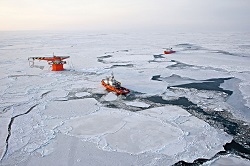- Home page /
- New technologies and equipment /
- Tomsk Institute of Petroleum Chemistry is Ready to Adapt its...
Tomsk Institute of Petroleum Chemistry is Ready to Adapt its Technologies to the Arctic Conditions
 |
| Courtesy of inotomsk.ru |
Institute of Petroleum Chemistry (IPC) of the RAS SB (Russian Academy of Sciences Siberian Branch) in Tomsk, which is engaged in the development of hard to recover reserves extraction technologies, can adapt them for the use in the Arctic conditions, the Institute press service reported.
Potential reserves in the Russian Arctic are estimated at 100 billion toe (tons of oil equivalent), or 25% of the world's resources. By 2030, the production of hydrocarbons in the Arctic will increase by 2.5 times.
"The main trends of recent years are the shift of production to the north and the prevalence of heavy oil in the reserves structure. Now 65 percent of Russian fields are the fields with hard to recover reserves," said IPC director Lyubov Altunina.
Enhanced recovery is one of the directions of IPC SB RAS activities. Institute has developed 11 industrial technologies for the fields in Western Siberia and Komi Republic, adjacent to the Arctic zone. And these methods, according to the head of IPC can be easily adapted to extreme offshore conditions.
"Reagents for the Arctic need to work at low temperatures, they should be easily dissolved and pumped,” said Altunina. “For example, we make oil-displacing compositions with freezing temperatures ranging from -20 to -60 degrees. You can use them for the technique, which the oilmen already have. They are easy to prepare and inject. Of no less importance is the fact, that we use the reagents beyond the fourth class of danger, that is, low-hazard or safe for humans and the environment," she adds.
Hard to recover reserves production technologies developed by IPC are divided into several types. These are technologies using displacing compositions, flushing oil out of the rock, and gel-forming compositions, which relocate flows and increase formation coverage. They can be used separately or combined.
"Oil reservoirs are like people, each one needs individualized approach”, says IPC director. “To increase the oil recovery factor, it is necessary to apply new technologies. One of them is the injection of gel-forming composition: under the influence of temperature it forms a gel screen in high-permeability, most washed part of the formation, the water rests on it, its flows relocate and oil displacement starts from low permeable, oil-saturated part of the formation. As a result, oil production from the well increases, water-cut reduces. It is also possible to pump surfactants in a low-permeability part, which better flush oil of reservoir rocks."
In the Arctic region it is possible, in particular, to implement the technology using GALKA inorganic gelling composition. It can be easy dissolved in any water, fresh or salt water, and can be delivered in the solid form. As a result, oil recovery increases by 5-8%, additional production amounts from 400 to 3000 tons per well treatment. METKA gelling composition is based on a polymer, which is generally only soluble in cold water and does not have the hazard class. In LUKOIL fields 286,000 tons of oil have been additionally produced with the use of METKA composition. The solid detergent composition NINKA and integrated technology of injection of GALKA-C and NINKA compositions showed good performance.
Technologies created in IPC SB RAS, have been pilot tested on Russian fields (Nizhnevartovsk, Langepas, Strezhevoy, Kogalym, Nyagan, Yugansk, Ukhta, etc.), Vietnam, China, Oman, Germany. Commercial production of compositions is organized in Russia and China. Technology is commercially used by oil companies LUKOIL, Rosneft and other: 200-300 well treatments per year are produced, more than 2 million tons of oil has been additionally produced over the past five years. The technology is protected by more than 20 patents of Russia and four other countries (Vietnam, China, Canada and the European patent). 11 license agreements have been concluded, including one with China.
Source: inotomsk.ru

